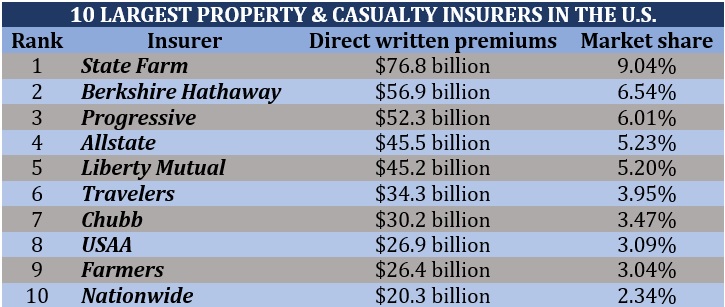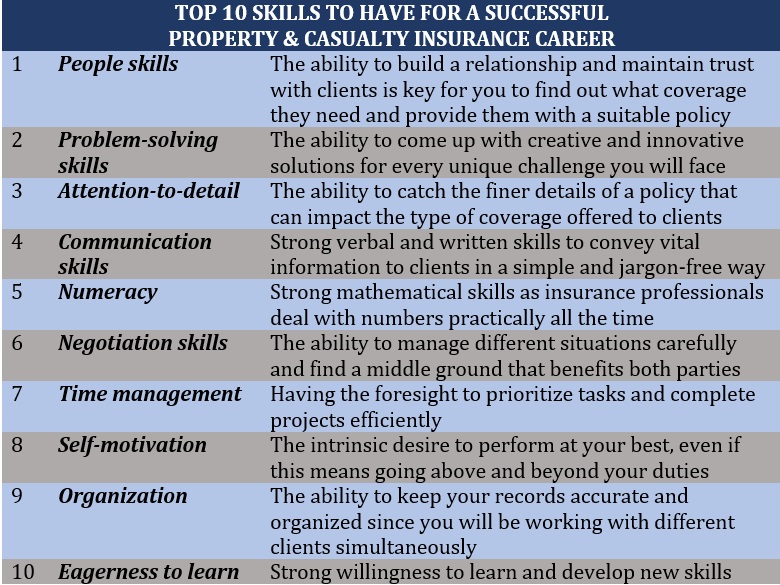

Property-casualty insurers play a crucial part in helping individuals and businesses protect their hard-earned investments such as their homes, vehicles, and certain commercial assets. If you find this role intriguing, then you may be wondering, “Is property-casualty insurers a good career path for me?”
To help you in your decision, Insurance Business will walk you through the advantages and disadvantages of working under the property and casualty insurance line. This guide will also give you a rundown of the different career options you can pursue and what it takes to be successful. Read on and find out if working for property-casualty insurers is a good career path for you.
Property and casualty insurance provides coverage for the things that individuals and businesses own. It consists of two parts that are often bundled into a single policy. These are:
Property and casualty insurance, also called P&C insurance, comes in a range of specialties. These include:
Whether or not working in the property and casualty insurance sector makes sense careerwise depends on a range of factors. One of these is your professional goals. Just like with other occupations, being a property and casualty insurance professional has its share of benefits and drawbacks. Here are some of the pros and cons that you need to consider before choosing a career in the industry.
The property and casualty insurance sector offers a range of professional opportunities that span beyond traditional roles, including insurance agents, adjusters, brokers, and underwriters. Depending on your skills, educational attainment, and professional experience, you can also land positions in actuary, customer service, data analytics, investigation, and technology, as well as senior management positions. We will discuss the different careers you can pursue within the sector in more detail in the succeeding section.
Choosing a career in the sector gives you an opportunity to work with the top property-casualty insurers in the country. The table below shows the 10 largest P&C insurance companies in the US, according to the latest figure from the National Association of Insurance Commissioners (NAIC).

State Farm and Farmers are among the top insurers in the sector, both of which attract agents who want to pursue careers in insurance. If you want to find out what type of compensation package these industry giants offer sales agents, you can check out our guides on how much State Farm insurance agents make and how much Farmers insurance agents make.
With people constantly in need of financial protection – whether when driving their cars, investing in homes, seeking healthcare treatment, and operating businesses – insurance products will also be always in demand.
Depending on the role, some insurance professionals are given the flexibility to set their work schedules. There are also ample opportunities to work from home, although some occupations will require that you meet up with clients in-person outside your residence.
Many property-casualty insurers implement measures to ensure work-life balance by giving staff sufficient time to pursue interests outside work. This has been proven to boost engagement and productivity in the workplace.
If you want to know which insurers provide such benefits to their employees, you can check out our list of the best insurance companies to work for in the US.
Another factor that makes working for property-casualty insurers a good career path is earning a good living salary with a strong potential for growth. Some professions, including insurance agents and brokers, earn commission-based incomes. This means that if you choose to become one and have a great work ethic that matches the role, you will also have more opportunities to earn a higher income.
Wondering how much an agent makes selling insurance? You can find out everything you need to know about insurance agent salary in this comprehensive guide.
Having a commission-based insurance job also has its disadvantages. Among these is the unpredictability of how much your next paycheck will be. Your earnings will depend on the quantity of sales you make or claims you assess. This also means that if you don’t push yourself hard, your income will reflect it.
A career in the property and casualty insurance sector can be fast paced with constant pressure to perform at your best. This can result in high amounts of stress, which often lead to burnout.
Although there are some roles that don’t require college degrees, many property-casualty insurers prefer candidates who have one. Most states also implement their own licensing requirements. If you plan to practice in a different location, you need to comply with these qualifications. Some occupations will require you to take up continuing education to move up the career ladder.
If you opt for an independent role, you will most likely not have access to a full range of employee benefits. This means you will have limited paid time off. For many commission-based jobs, taking time off also takes away time that you may otherwise have spent building relationships with clients and looking for leads. This can cost you a portion of your earnings.
Here’s a summary of the advantages and drawbacks of choosing a career with a property-casualty insurer:

As mentioned, working in the property and casualty insurance sector offers a range of career opportunities. Some of the most prominent P&C insurance roles include:
To be successful in your chosen P&C career, you must have the right mix of hard and soft skills that can enable you to connect with clients and match them with the best possible coverage.
The table below lists some of the most crucial skills and attributes that you should possess to ensure that working with property-casualty insurers is a good career path for you.

Our Best in Insurance Special Reports page is the place to go if you want to find the top property-casualty insurers to start or continue your career. The insurance companies featured in these special reports have been nominated by their peers and vetted by industry experts as respected and dependable market leaders.
If you choose to work with these property-casualty insurers, you can be sure that you’re going with a company that prioritizes employee wellbeing and provides a positive workplace culture. These will allow you to thrive in your insurance career.
Do you think working with property-casualty insurers is a good career path? What other skills and qualifications do you think are essential to have a successful P&C insurance career? Share your thoughts in the comments section below.
